Claude Forthomme's Blog, page 14
February 27, 2017
Europe at the Crossroads

Impakter has just published my latest essay: EUROPE AT THE CROSSROADS. I've worked hard to try and figure out where Europe is going, if anywhere...
Here is the beginning:
WHAT IS WRONG WITH THE EUROPEAN UNION?
On 25 March 2017, we will know whether Europe – as a “project” for an increased “union” – plans to go forward, fade away or split up.
That is the date of the much-awaited European Summit to be held in Rome to celebrate (without UK Prime Minister May) the 60 years of the European Union. The celebration could turn into a funeral if the 27 heads of EU member nations cannot agree on a so-called “White Paper”, a.k.a. “the Rome Statement”, that they are meant to adopt as a common declaration on Europe’s future.

Alarm-Europe-Logo PHOTO CREDIT: MARCH FOR EUROPE
What does this White Paper say? If you google it, you won’t find it. At the time of writing, it’s still under wraps in Brussels. All we know for now is that there has been a preliminary “white paper” prepared by the Benelux countries, Belgium, the Netherlands and Luxembourg, part of the original six founding member countries (the other three are France, Germany and Italy). And there was a recent declaration by German Chancellor Merkel at the EU Summit meeting held in Malta that drew attention and irked some EU members. “This would destroy Europe!” thundered the Pole with the nodding support of other Eastern Europeans.
 What did Ms. Merkel say that was so provocative? She aired the possibility of a “multi-speed” Europe – the idea is simple enough: those EU members who want it should be allowed to go forward with integration, the others would be left to proceed slower, at their own pace.
What did Ms. Merkel say that was so provocative? She aired the possibility of a “multi-speed” Europe – the idea is simple enough: those EU members who want it should be allowed to go forward with integration, the others would be left to proceed slower, at their own pace.IN THE PHOTO: ANGELA MERKEL PHOTO CREDIT: ELZA FIÙZA/AGÊNCIA BRASIL, CC BY 3.0 WIKIMEDIA COMMONS
This is not a particularly new idea, she had already aired it two years ago. And it is an idea dear to the Italians who have been pushing it for some time – most recently asking for a “Schengen union for security” to try and solve the problem of immigrants rushing across the Mediterranean. Leading Italian political scientists are also behind the “federal solution” for Europe – notably Sergio Fabbrini, Director of the Luiss School of Government and author of multiple books on Europe who has also expounded it in the country’s leading financial paper, il Sole 24 Ore.
Annoyed by the brouhaha from Eastern European members, the French President Hollande who felt a reference to a “multi-speed Europe” should find its way in the March 25 White Paper, told reporters:
PHOTO (RIGHT): FRANÇOIS HOLLANDE PHOTO CREDIT: FLICKR/JEAN-MARC AYRAULTCC BY 2.0, WIKIMEDIA COMMONSEurope isn’t a cash-box, not a self-service restaurant, a Europe where you come and take what you need, where you take your structural funds or get access to the internal market and then show no solidarity at all in return. Europe was built to be stronger together and it’s that rule, that principle, which should be driven home in March.
So we have two contrasting views of the European Project and, implicitly, a two-speed Europe: a “Europe à la carte”, that pleases Eastern Europeans and Scandinavians who only seek economic benefits and balk at political integration; and a “federal Europe”, more forward-looking and congenial to continental Europeans. Also, good news for federalists, the French-German alliance that had been driving Europe so far could turn into a foursome: France, Germany, Italy and Spain. They have already agreed to meet in Versailles on 6 March – holding a preparatory “mini-Summit” of their own; and thus immediately angering Poland that threatens to hold counter mini-summits with either the Visegrad group (Poland, the Czech Republic, Hungary and Slovakia) or the Bucharest nine (Bulgaria, the Czech Republic, Estonia, Latvia, Lithuania, Poland, Romania, Slovakia and Hungary).
Multi-speed Europe is already a reality…
Meanwhile, the Benelux countries in their “white paper”, while supporting the “Bratislava Declaration and its roadmap” as the way forward, talked about the “subsidiarity” and “proportionality” principles in the usual convoluted EU Treaty language that baffles most European citizens:
“The EU shall only act if and in so far as the objectives of the proposed action cannot be sufficiently achieved by the member states, either at central level or at regional and local level, but can rather, by reason of the scale or effects of the proposed action be achieved at Union level. The EU will only do what member states themselves are not able to deliver for their citizens.”
Note the phrase “by reason of the scale or effects of the proposed action”: this is meant to indicate the Union (because it is larger in scale) can do certain tasks better than a member country. The corollary: European integration cannot impinge upon what is best done at national level, that’s where “subsidiarity” stops.
So where does this leave the “European Project”? Do we go for more “union” or less? Is “more union” politically viable?
THE ROOTS OF EUROSKEPTICISM
The basic problem is rising “euroskepticism”, a new term coined to indicate that Europeans are distrustful of Brussels and European institutions that they see as “power-grabbing” and too distant from them.
Brexit was only the first alarm bell. We now speak of Frexit (for France), Nexit (for the Netherlands), Auxit (for Austria) etc. Trump’s constant denigration of the EU (calling it a “vehicle for Germany”) and his open support of Brexit and other EU-member exits, has further unsettled Europeans.
On 18 February, at the Munich Security Conference, US Vice President Pence sought to reassure Europeans that the US supports NATO and the Minsk II accord for Ukraine, indicating America would stand firmly behind Europe against Russia. Can Europeans trust Pence? A month into the Trump presidency, it is still unclear whether Trump is top dog and therefore his bark matters, or whether he is a tweeting Reality TV star and therefore his cabinet matters. On February 24, in an interview with Reuters, Trump made a surprising u-turn, declaring himself “totally in favor” of the EU…but for how long?
It is a fact however that Trump has become a populist icon, deeply resonating with the rising populist movements in Europe, all calling for an exit of the Euro and Europe – from Marine Le Pen in France to Geert Wilders in the Netherlands to Frauke Petry in Germany to Beppe Grillo in Italy. They all liken themselves to Trump.

IN THE PHOTO: BEPPE GRILLO AT THE RALLY OF THE FIVE STAR MOVEMENT IN PIAZZA DANTE IN TRENT, ITALY, FOR THE PARTY’S PRESENTATION OF ITS 2013 ELECTORAL SLATE PHOTO CREDIT: NICCOLÒ CARANTI
Listen to Grillo, an ex-TV comedy star, now sixty-nine but with a continuing appeal on young Italians:
“I’m a comedian. You have to understand that my brain doesn’t work like a politician’s brain. I think about something, then the next day I say something else. It’s a very beautiful word, populism. I’m proud to be a populist.”
And about Europe, this is what he had to say:
“It is an enormous apparatus, with two parliaments, in Brussels and Strasbourg, to please the French. I am in favor of a different Europe, where each state can adopt its fiscal and monetary system. I want the Eurobond, a 20 percent devalued euro for southern European countries, protecting our products against those arriving from abroad, and a revision of the 3 percent deficit budgetary rule. I no longer feel the spirit of Europe.”
To read the rest, click here: http://impakter.com/europe-at-the-cro...









Published on February 27, 2017 10:07
February 16, 2017
POPULISM TRUMP-STYLE: A THREAT TO DEMOCRACY ?
My latest article, just out on Impakter Magazine:
TRUMP POPULISM: A THREAT TO DEMOCRACY ?

BOOK REVIEW: WHAT IS POPULISM? BY JAN-WERNER MÜLLER
UNIVERSITY OF PENNSYLVANIA PRESS, AUGUST 22, 2016. 136 PAGES.
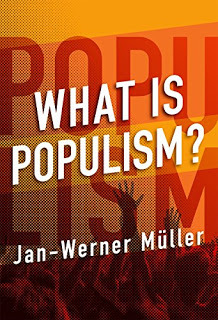 From Brexit, the referendum that kicked the UK out of the EU, to Trump’s election predicated on “draining the swamp” in Washington and making “America Great Again”, the sudden rise of populist nationalism shook the US and Europe in 2016. With Trump in the driving seat, what will 2017 hold? Should we worry?
From Brexit, the referendum that kicked the UK out of the EU, to Trump’s election predicated on “draining the swamp” in Washington and making “America Great Again”, the sudden rise of populist nationalism shook the US and Europe in 2016. With Trump in the driving seat, what will 2017 hold? Should we worry?
A new book “What is Populism?” by Jan-Werner Müller, a noted German political scientist, brings much needed answers. It provides an elegant explanation of a phenomenon of our times, populism, that threatens to upend the post-World War II global order as we know it.
WHO IS THE AUTHOR AND WHY SHOULD WE PAY ATTENTION TO WHAT HE SAYS?
Professor Jan-Werner Müller, born in 1970, comes with impressive credentials: he studied at the Berlin Free University; London University College; Oxford St. Antony’s College and Princeton University. He was a Fellow of All Souls College, Oxford (1996-2003) and a Fellow in Modern European Thought at the European Studies Centre, St. Antony’s College (2003-2005). Since then he has been teaching in the Politics Department, Princeton University where he currently directs the Project in the History of Political Thought at the University Center for Human Values.
“What is Populism?” was first published in Germany in April 2016 (by Surhkamp) and brought out in English (by University of Pennsylvania Press) last August with some modifications to adapt it to an American audience; but the interesting analysis of Hungary’s dramatic slide into autocracy under populist strongman Viktor Orban has remained intact. Considering Orban’s style of government (for example, in his recent “State of Hungary” speech on 10 February, he violently attacked the billionaire philanthropist George Soros, see Fox News report here) and his plan to run for re-election in 2018, that section of Muller’s book is highly relevant.
The book is short, some 130 pages, consisting of just three chapters, an easy read, made all the easier that the conclusion consists of “Seven Theses on Populism” that neatly summarize the whole book. It has drawn attention in academic circles and sells well on Amazon (ranked #11 in the category “comparative politics” at the time of writing).
WHAT EXACTLY IS “POPULISM” AND WHY SHOULD WE WORRY?
As Müller notes in his introduction, “no US election in living memory has seen as many invocations of ‘populism’ as the one unfolding in 2015-16”. And the same can be said now of the coming elections in Europe, in some key EU member countries: France, the Netherlands, Germany and Italy (though elections in the latter may be postponed to next year).
In all these countries, populist parties are on the rise and all uniformly promise to bring down the “established order”: down with the Euro and the European Union, up with borders, each country onto itself. Just listen to the front-running candidate for the French Presidency, Marine Le Pen of the Front National, it’s an eye-opener. Here is what she said on February 5 when she launched her campaign in Lyon, unveiling a 144-point program calling for leaving the euro-zone, holding a referendum on European Union membership, and limiting immigration:
Perhaps what is most bizarre about populism is that it can arise on the right as well as on the left. The label applies equally to Donald Trump and Bernie Sanders. And, as Müller writes, it is “primarily associated with particular moods and emotions: populists are ‘angry’; their voters are ‘frustrated’ or suffer from ‘resentment.’”

IN THE PHOTO: ANGER AT A TRUMP RALLY IN CHICAGO 22 OCTOBER 2016 PHOTO CREDIT: JUSTICE VIA WIKIMEDIA COMMONS
Beyond that, Müller notes, we haven’t had a convincing “theory of populism”, there is no “coherent criteria” for deciding when politicians turn populists. And this is where his definition comes in, setting out exactly what makes for a populist and how he (or she) is different from the run-of-the-mill politician in a democracy.
After all, any politician in the opposition will attack the establishment. It is in the DNA of the opposition. And all politicians try to appeal to their voters and do this in emotional terms (if they can). They know emotions will move voters.
Could populism be “the authentic voice of democracy” as the American cultural historian Christopher Lasch maintained?
Müller begs to disagree. He puts forward deceptively simple and strikingly logical criteria that set a populist apart from a regular politician:
Curious about Müller's "strikingly logical criteria"? Click here to read the rest.









TRUMP POPULISM: A THREAT TO DEMOCRACY ?

BOOK REVIEW: WHAT IS POPULISM? BY JAN-WERNER MÜLLER
UNIVERSITY OF PENNSYLVANIA PRESS, AUGUST 22, 2016. 136 PAGES.
 From Brexit, the referendum that kicked the UK out of the EU, to Trump’s election predicated on “draining the swamp” in Washington and making “America Great Again”, the sudden rise of populist nationalism shook the US and Europe in 2016. With Trump in the driving seat, what will 2017 hold? Should we worry?
From Brexit, the referendum that kicked the UK out of the EU, to Trump’s election predicated on “draining the swamp” in Washington and making “America Great Again”, the sudden rise of populist nationalism shook the US and Europe in 2016. With Trump in the driving seat, what will 2017 hold? Should we worry?A new book “What is Populism?” by Jan-Werner Müller, a noted German political scientist, brings much needed answers. It provides an elegant explanation of a phenomenon of our times, populism, that threatens to upend the post-World War II global order as we know it.
WHO IS THE AUTHOR AND WHY SHOULD WE PAY ATTENTION TO WHAT HE SAYS?
Professor Jan-Werner Müller, born in 1970, comes with impressive credentials: he studied at the Berlin Free University; London University College; Oxford St. Antony’s College and Princeton University. He was a Fellow of All Souls College, Oxford (1996-2003) and a Fellow in Modern European Thought at the European Studies Centre, St. Antony’s College (2003-2005). Since then he has been teaching in the Politics Department, Princeton University where he currently directs the Project in the History of Political Thought at the University Center for Human Values.
“What is Populism?” was first published in Germany in April 2016 (by Surhkamp) and brought out in English (by University of Pennsylvania Press) last August with some modifications to adapt it to an American audience; but the interesting analysis of Hungary’s dramatic slide into autocracy under populist strongman Viktor Orban has remained intact. Considering Orban’s style of government (for example, in his recent “State of Hungary” speech on 10 February, he violently attacked the billionaire philanthropist George Soros, see Fox News report here) and his plan to run for re-election in 2018, that section of Muller’s book is highly relevant.
The book is short, some 130 pages, consisting of just three chapters, an easy read, made all the easier that the conclusion consists of “Seven Theses on Populism” that neatly summarize the whole book. It has drawn attention in academic circles and sells well on Amazon (ranked #11 in the category “comparative politics” at the time of writing).
WHAT EXACTLY IS “POPULISM” AND WHY SHOULD WE WORRY?
As Müller notes in his introduction, “no US election in living memory has seen as many invocations of ‘populism’ as the one unfolding in 2015-16”. And the same can be said now of the coming elections in Europe, in some key EU member countries: France, the Netherlands, Germany and Italy (though elections in the latter may be postponed to next year).
In all these countries, populist parties are on the rise and all uniformly promise to bring down the “established order”: down with the Euro and the European Union, up with borders, each country onto itself. Just listen to the front-running candidate for the French Presidency, Marine Le Pen of the Front National, it’s an eye-opener. Here is what she said on February 5 when she launched her campaign in Lyon, unveiling a 144-point program calling for leaving the euro-zone, holding a referendum on European Union membership, and limiting immigration:
Globalization is my enemy, one in the name of global finance and one in the name of radical Islam […] They will lead to the disappearance of this France, as we remember it and as we love it. One advances under the guise of liberal economics, the other under the guise of religious liberty.
Perhaps what is most bizarre about populism is that it can arise on the right as well as on the left. The label applies equally to Donald Trump and Bernie Sanders. And, as Müller writes, it is “primarily associated with particular moods and emotions: populists are ‘angry’; their voters are ‘frustrated’ or suffer from ‘resentment.’”

IN THE PHOTO: ANGER AT A TRUMP RALLY IN CHICAGO 22 OCTOBER 2016 PHOTO CREDIT: JUSTICE VIA WIKIMEDIA COMMONS
Beyond that, Müller notes, we haven’t had a convincing “theory of populism”, there is no “coherent criteria” for deciding when politicians turn populists. And this is where his definition comes in, setting out exactly what makes for a populist and how he (or she) is different from the run-of-the-mill politician in a democracy.
After all, any politician in the opposition will attack the establishment. It is in the DNA of the opposition. And all politicians try to appeal to their voters and do this in emotional terms (if they can). They know emotions will move voters.
Could populism be “the authentic voice of democracy” as the American cultural historian Christopher Lasch maintained?
Müller begs to disagree. He puts forward deceptively simple and strikingly logical criteria that set a populist apart from a regular politician:
Curious about Müller's "strikingly logical criteria"? Click here to read the rest.









Published on February 16, 2017 12:07
February 9, 2017
THE TRUMP EFFECT: THE TRUTH ABOUT THE POPE AND THE ORDER OF MALTA
Here's another of my articles, just published on Impakter:

The media has recently reported some eye-popping news about the Pope and the Order of Malta allegedly engaged in a power struggle, with the Grand Master of the Order losing the battle and “forced” to resign.
What we have here is the kind of spectacle the media relishes: On one side, the Pope is depicted as the “anti-Trump Pope” for example, see the New Yorker’s article written by James Carroll, an American Catholic reformer and author of eleven novels and eight works of non-fiction, clearly in search of his next plot. On the other side, the Order of Malta, a millenarian Catholic institution with a global, humanitarian mandate, is presented as helplessly in the grips of Cardinal Edmund Burke, a well-known hardliner. An American, Cardinal Burke is adamant about fighting Islam and he is a darling of the populists. So what do you get? A juicy alt-right picture of a clash between a supposedly rigidly conservative Order and a progressive Pope.

IN THE PHOTO: POPE RECEIVES GRAND MASTER IN AUDIENCE, IN EARLIER BETTER DAYS (JUNE 2016) PHOTO CREDIT: ORDER OF MALTA WEBSITE
To make it more credible, the Order is reported by some as an out-of-step relic of the Catholic Church, with its members parading around in “nutcracker” red uniforms. Instead, it is, historically, the oldest existing humanitarian organization. It started out nine hundred years ago to assist pilgrims in Jerusalem. Today, its mandate has broadened to cover children, the homeless, handicapped, refugees, elders, terminally ill and lepers around the world without distinction of ethnicity or religion.

IN THE PHOTO: UPHOLDING HUMAN DIGNITY AND CARING FOR PEOPLE IN NEED. PHOTO CREDIT: ORDER OF MALTA WEBSITE
The Order deploys 120,000 people, some 13,500 Knights, Dames and auxiliary members, 25,000 paid medical personnel and 80,000 volunteers. With its world-wide relief agency, Malteser International, it provides emergency aid in natural disasters, epidemics and war.
The Order is not just another charitable organization: it maintains diplomatic relations with 106 countries, the European Union and the United Nations (the latter as permanent observer), thus effectively linking diplomacy with aid. In short, it has a status similar to that of a government-in-exile, having surrendered its territory – the island of Malta – to Napoleon in 1798 and never recovered it, in spite of a resolution of the 1802 Amiens Treaty and the 1815 Congress of Vienna (it was never applied, the English refused to give it back).
In fact, in this complicated story which we can only glean through partial and even fake news (!), the American Cardinal seems to play a key role. And, as I show below, this is not, contrary to stories in the press, a clash between the Pope and the Order of Malta: They are, and never stopped being together on the same side of human values.
THE ORDER’S GOVERNMENT CRISIS, THE FIRST IN OUR TIME
On 6 December 2016, the unthinkable happened: The Prince and Grand Master, Frà Robert Matthew Festing, the third Englishman to serve as Grand Master, suspended the Grand Chancellor, Albrecht Freiherr von Boeselager, a German national and moved to expel him from the Order. The Grand Chancellor, who had been faithfully serving the Order for 40 years (since 1976), immediately denied all allegations of wrong-doing, refused to resign or leave the Order and reportedly contacted Cardinal Parolin, close to the Pope, to obtain guidance.
Wonder how the story ends? To read the rest on Impakter, click here.










The media has recently reported some eye-popping news about the Pope and the Order of Malta allegedly engaged in a power struggle, with the Grand Master of the Order losing the battle and “forced” to resign.
What we have here is the kind of spectacle the media relishes: On one side, the Pope is depicted as the “anti-Trump Pope” for example, see the New Yorker’s article written by James Carroll, an American Catholic reformer and author of eleven novels and eight works of non-fiction, clearly in search of his next plot. On the other side, the Order of Malta, a millenarian Catholic institution with a global, humanitarian mandate, is presented as helplessly in the grips of Cardinal Edmund Burke, a well-known hardliner. An American, Cardinal Burke is adamant about fighting Islam and he is a darling of the populists. So what do you get? A juicy alt-right picture of a clash between a supposedly rigidly conservative Order and a progressive Pope.

IN THE PHOTO: POPE RECEIVES GRAND MASTER IN AUDIENCE, IN EARLIER BETTER DAYS (JUNE 2016) PHOTO CREDIT: ORDER OF MALTA WEBSITE
To make it more credible, the Order is reported by some as an out-of-step relic of the Catholic Church, with its members parading around in “nutcracker” red uniforms. Instead, it is, historically, the oldest existing humanitarian organization. It started out nine hundred years ago to assist pilgrims in Jerusalem. Today, its mandate has broadened to cover children, the homeless, handicapped, refugees, elders, terminally ill and lepers around the world without distinction of ethnicity or religion.

IN THE PHOTO: UPHOLDING HUMAN DIGNITY AND CARING FOR PEOPLE IN NEED. PHOTO CREDIT: ORDER OF MALTA WEBSITE
The Order deploys 120,000 people, some 13,500 Knights, Dames and auxiliary members, 25,000 paid medical personnel and 80,000 volunteers. With its world-wide relief agency, Malteser International, it provides emergency aid in natural disasters, epidemics and war.
The Order is not just another charitable organization: it maintains diplomatic relations with 106 countries, the European Union and the United Nations (the latter as permanent observer), thus effectively linking diplomacy with aid. In short, it has a status similar to that of a government-in-exile, having surrendered its territory – the island of Malta – to Napoleon in 1798 and never recovered it, in spite of a resolution of the 1802 Amiens Treaty and the 1815 Congress of Vienna (it was never applied, the English refused to give it back).
In fact, in this complicated story which we can only glean through partial and even fake news (!), the American Cardinal seems to play a key role. And, as I show below, this is not, contrary to stories in the press, a clash between the Pope and the Order of Malta: They are, and never stopped being together on the same side of human values.
THE ORDER’S GOVERNMENT CRISIS, THE FIRST IN OUR TIME
On 6 December 2016, the unthinkable happened: The Prince and Grand Master, Frà Robert Matthew Festing, the third Englishman to serve as Grand Master, suspended the Grand Chancellor, Albrecht Freiherr von Boeselager, a German national and moved to expel him from the Order. The Grand Chancellor, who had been faithfully serving the Order for 40 years (since 1976), immediately denied all allegations of wrong-doing, refused to resign or leave the Order and reportedly contacted Cardinal Parolin, close to the Pope, to obtain guidance.
Wonder how the story ends? To read the rest on Impakter, click here.









Published on February 09, 2017 06:33
January 17, 2017
SILICON VALLEY: WHAT IT TAKES TO DO STARTUPS - Book Review
Here's another one of my articles published today on Impakter:

SILICON VALLEY: WHAT IT TAKES TO DO STARTUPSBook Review: Chaos Monkeys: Obscene Fortune and Random Failure in Silicon Valley by Antonio Garcìa Martinez (HarperCollins, 2016, 528 pages)
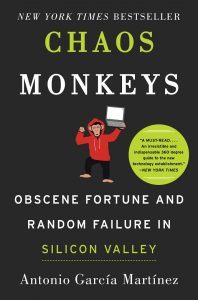 Silicon Valley continues to be hot news in the age of Trump and anti-globalization and it should come as no surprise that a clever book about it by someone in the know, loaded with revelatory insights on how it really works, was going to be a sure-fire hit. And that is exactly what happened when Antonio García Martinez's half memoir-half prescriptive tech guidebook came out last year on 28 June 2016, becoming an instant “New York Times bestseller”. Considered an “irreverent exposé of life inside the tech bubble”, all the major book reviewers rushed in with praise, from the New York Times’ Jonathan E. Knee (“an irresistible and indispensable 360-degree guide to the new technology establishment”) to Bloomberg’s Ellen Huet (“dives into the unburnished, day-to-day realities: the frantic pivots, the enthusiastic ass-kissing, the excruciating internal politics”).
Silicon Valley continues to be hot news in the age of Trump and anti-globalization and it should come as no surprise that a clever book about it by someone in the know, loaded with revelatory insights on how it really works, was going to be a sure-fire hit. And that is exactly what happened when Antonio García Martinez's half memoir-half prescriptive tech guidebook came out last year on 28 June 2016, becoming an instant “New York Times bestseller”. Considered an “irreverent exposé of life inside the tech bubble”, all the major book reviewers rushed in with praise, from the New York Times’ Jonathan E. Knee (“an irresistible and indispensable 360-degree guide to the new technology establishment”) to Bloomberg’s Ellen Huet (“dives into the unburnished, day-to-day realities: the frantic pivots, the enthusiastic ass-kissing, the excruciating internal politics”).
In short, in just six months, "Chaos Monkeys" has become the most popular and widely read book about Silicon Valley. I was curious to find out whether it merited its sudden glory. I uploaded it to my Kindle (disclosure: living far from bookstores, I am a fan of e-books) and I spent a couple of pleasant days enjoying the read. And I soon discovered that the best passages, literally pearls in the text, had been highlighted hundreds of time by enthusiastic fans. In fact, Amazon in its “about the book” section informs you that (at the time of my reading) 3,769 passages had been highlighted 122,000 times (ah, the joys of Big Data).
It is a clever book with a clever title, and a great read. In case you’re wondering about the title, it comes from the name given to the software procedure used to test the stability and resilience of online services/websites – and this neatly expresses the main message of the book: That tech entrepreneurs are society’s chaos monkeys, out to disrupt the way we live, from photo-sharing (Instagram), dating (Tinder) and movie viewing (Netflix) to transport (Uber), lodging (AirBnB) and space travel (SpaceX).
Unquestionably, the author’s persona was as much part of the excitement as his bracing writing style. Described as an “industry provocateur” on his Amazon book description page, he has lived up to his reputation and become something of an industry guru: today, whenever big news or scandals roil Silicon Valley, journalists rush to ask him his opinion.

Garcìa Martinez started his working life as a strategist for Goldman Sachs, survived three years and surprised everyone by abandoning New York for the West Coast. After learning the ropes at an IT advertising outfit called Adchemy, he launched his own start-up AdGrok with a couple of engineering pals (called “the boys” in his book). Ten months later, after raising some venture capital and before even making AdGrok operational, he sold it to Twitter for $5 million. However, it was not an unmitigated success; his team broke up, “the boys” went to work for Twitter to develop AdGrok while he accepted a more lucrative position at Facebook as product manager. Tasked with leveraging Facebook’s user data to make its advertising more effective and fix its monetization problem, he was outcompeted by a colleague and fired – the circumstances of his firing make for fascinating reading.
The description of what Facebook is like, what happened there and why he eventually left and landed an advisory position at Twitter is certainly one of the more interesting parts of the book – anyone thinking of joining Facebook should read it very carefully, drawing lessons from it.
The rest on Impakter, to read it, click here.










SILICON VALLEY: WHAT IT TAKES TO DO STARTUPSBook Review: Chaos Monkeys: Obscene Fortune and Random Failure in Silicon Valley by Antonio Garcìa Martinez (HarperCollins, 2016, 528 pages)
 Silicon Valley continues to be hot news in the age of Trump and anti-globalization and it should come as no surprise that a clever book about it by someone in the know, loaded with revelatory insights on how it really works, was going to be a sure-fire hit. And that is exactly what happened when Antonio García Martinez's half memoir-half prescriptive tech guidebook came out last year on 28 June 2016, becoming an instant “New York Times bestseller”. Considered an “irreverent exposé of life inside the tech bubble”, all the major book reviewers rushed in with praise, from the New York Times’ Jonathan E. Knee (“an irresistible and indispensable 360-degree guide to the new technology establishment”) to Bloomberg’s Ellen Huet (“dives into the unburnished, day-to-day realities: the frantic pivots, the enthusiastic ass-kissing, the excruciating internal politics”).
Silicon Valley continues to be hot news in the age of Trump and anti-globalization and it should come as no surprise that a clever book about it by someone in the know, loaded with revelatory insights on how it really works, was going to be a sure-fire hit. And that is exactly what happened when Antonio García Martinez's half memoir-half prescriptive tech guidebook came out last year on 28 June 2016, becoming an instant “New York Times bestseller”. Considered an “irreverent exposé of life inside the tech bubble”, all the major book reviewers rushed in with praise, from the New York Times’ Jonathan E. Knee (“an irresistible and indispensable 360-degree guide to the new technology establishment”) to Bloomberg’s Ellen Huet (“dives into the unburnished, day-to-day realities: the frantic pivots, the enthusiastic ass-kissing, the excruciating internal politics”).In short, in just six months, "Chaos Monkeys" has become the most popular and widely read book about Silicon Valley. I was curious to find out whether it merited its sudden glory. I uploaded it to my Kindle (disclosure: living far from bookstores, I am a fan of e-books) and I spent a couple of pleasant days enjoying the read. And I soon discovered that the best passages, literally pearls in the text, had been highlighted hundreds of time by enthusiastic fans. In fact, Amazon in its “about the book” section informs you that (at the time of my reading) 3,769 passages had been highlighted 122,000 times (ah, the joys of Big Data).
It is a clever book with a clever title, and a great read. In case you’re wondering about the title, it comes from the name given to the software procedure used to test the stability and resilience of online services/websites – and this neatly expresses the main message of the book: That tech entrepreneurs are society’s chaos monkeys, out to disrupt the way we live, from photo-sharing (Instagram), dating (Tinder) and movie viewing (Netflix) to transport (Uber), lodging (AirBnB) and space travel (SpaceX).
Unquestionably, the author’s persona was as much part of the excitement as his bracing writing style. Described as an “industry provocateur” on his Amazon book description page, he has lived up to his reputation and become something of an industry guru: today, whenever big news or scandals roil Silicon Valley, journalists rush to ask him his opinion.

Garcìa Martinez started his working life as a strategist for Goldman Sachs, survived three years and surprised everyone by abandoning New York for the West Coast. After learning the ropes at an IT advertising outfit called Adchemy, he launched his own start-up AdGrok with a couple of engineering pals (called “the boys” in his book). Ten months later, after raising some venture capital and before even making AdGrok operational, he sold it to Twitter for $5 million. However, it was not an unmitigated success; his team broke up, “the boys” went to work for Twitter to develop AdGrok while he accepted a more lucrative position at Facebook as product manager. Tasked with leveraging Facebook’s user data to make its advertising more effective and fix its monetization problem, he was outcompeted by a colleague and fired – the circumstances of his firing make for fascinating reading.
The description of what Facebook is like, what happened there and why he eventually left and landed an advisory position at Twitter is certainly one of the more interesting parts of the book – anyone thinking of joining Facebook should read it very carefully, drawing lessons from it.
The rest on Impakter, to read it, click here.









Published on January 17, 2017 01:42
December 31, 2016
Why 2017 Could be Better Than You Think: Happy New Year!
I just had my latest piece published on Impakter magazine, the fast-growing magazine for millennials where I am Senior Editor – and this is also my way to wish you all a very Happy, Hyggelig New Year!Here is the beginning of the article:Why 2017 Could Be Better Than You Think










At the end of the year, the prediction game becomes a top sporting event in the publishing industry, with everyone throwing their predictions on the wall to see if they stick. I’ll throw mine too but I’ll do it in reverse. I shall bet against most other people’s predictions.Let’s start with populism: that’s a basic trend everyone has identified in recent events, from Brexit to Trump – a new trend trumpeted as the end of neo-liberal democracy as we have known it since World War II. We are into another era, the new age of populism, nationalism, nativism, racism, identity politics, return-to-our-roots culture, anti-globalization, xenophobia, you name it. Dictionary.com has made xenophobia the word of the year. In short, everyone sees populism as a major feature that will govern what happens politically in 2017.But what if everyone was wrong?Read the rest on Impakter, click here.All the best!ClaudeMy new website: www.claudeforthomme.com









Published on December 31, 2016 02:57
December 7, 2016
How Trump is Changing America and What Writers Have to Say
This is how one Italian blogger sees the President-Elect - once Trump moves into the White House, since his wife Melanie apparently has no desire to live there, expect this to happen:

Yes, the American Presidency, with Trump in the driving seat, has lost much of its dignity. Satirists around the world are waking up to the golden opportunity to make fun of him.
But is there really much to laugh about?
The first shocking thing are the numbers. Perhaps Americans, familiar with their bizarre Electoral Voting System are used to it and don't see the inequity in it. But people who are not American cannot understand that a man who has garnered fully 2 million votes less than his opponent still wins the Presidency.
What kind of democracy is that? Where is social justice?
We are bombarded with frightening news coming out of America, and people who normally write novels and short stories have suddenly turned political. That is very unusual for American writers: in my experience, and at least this was the case through the Obama years, most of them refused to "take sides". I couldn't quite figure out why but I imagined they were afraid of losing fans and book sales. Being a European writer myself, I find that astonishing. Over here, on this side of the pond, we are used to writers and artists taking sides - indeed, through most of the 20th century, most of them were Communists. Take the example of France, starting with Simone de Beauvoir and Jean-Paul Sartre - very few were on the right, Céline being the historic exception, of course (he was pro-Nazi, anti-Jew and a collaborationist).
So what are American writers saying now about Trumpian America?
 So far, not many have come out. I was able to only identify only two so far and, oddly enough, both of them with articles published in the UK Guardian: Barbara Kingsolver, the author of 14 books including climate fiction masterpiece "Flight Behavior" and Dave Eggers, a prolific author spanning from non fiction, a best-selling memoir "A Heartbreaking Work of Staggering Genius" to fiction, including "The What is What"an extraordinary novel about a Sudanese child immigrant in the US.
So far, not many have come out. I was able to only identify only two so far and, oddly enough, both of them with articles published in the UK Guardian: Barbara Kingsolver, the author of 14 books including climate fiction masterpiece "Flight Behavior" and Dave Eggers, a prolific author spanning from non fiction, a best-selling memoir "A Heartbreaking Work of Staggering Genius" to fiction, including "The What is What"an extraordinary novel about a Sudanese child immigrant in the US.
How about the New York Times and Impakter magazine coming forward with similar pieces? As a Senior Editor of Impakter, I would welcome such articles...
Kingsolver strikingly summed up post-election America like this:
What's left standing? Not much, it would seem - and hits to international trade and the fight against climate change can affect the whole world, cause a word-wide recession, perhaps a repeat of the Big Depression and even threaten the planet's very survival as global warming proceeds unabated. We all need America on the front line of the climate change struggle, but with Trump in charge, can this happen?
Kingsolver minces no words, she calls on everyone to stand up and fight:
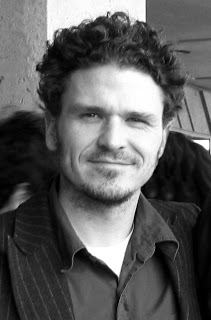 Dave Eggers piece is in many ways the opposite of Barbara Kingsolver's: he manifests surprise, he is almost awed by the divided country he sees as he travels through it. It's a long, thoughtful piece, beautifully written, but his concluding comment is no less moving than Kingsolver's, he is deeply worried, he tells us, because:
Dave Eggers piece is in many ways the opposite of Barbara Kingsolver's: he manifests surprise, he is almost awed by the divided country he sees as he travels through it. It's a long, thoughtful piece, beautifully written, but his concluding comment is no less moving than Kingsolver's, he is deeply worried, he tells us, because:










Yes, the American Presidency, with Trump in the driving seat, has lost much of its dignity. Satirists around the world are waking up to the golden opportunity to make fun of him.
But is there really much to laugh about?
The first shocking thing are the numbers. Perhaps Americans, familiar with their bizarre Electoral Voting System are used to it and don't see the inequity in it. But people who are not American cannot understand that a man who has garnered fully 2 million votes less than his opponent still wins the Presidency.
What kind of democracy is that? Where is social justice?
We are bombarded with frightening news coming out of America, and people who normally write novels and short stories have suddenly turned political. That is very unusual for American writers: in my experience, and at least this was the case through the Obama years, most of them refused to "take sides". I couldn't quite figure out why but I imagined they were afraid of losing fans and book sales. Being a European writer myself, I find that astonishing. Over here, on this side of the pond, we are used to writers and artists taking sides - indeed, through most of the 20th century, most of them were Communists. Take the example of France, starting with Simone de Beauvoir and Jean-Paul Sartre - very few were on the right, Céline being the historic exception, of course (he was pro-Nazi, anti-Jew and a collaborationist).
So what are American writers saying now about Trumpian America?
 So far, not many have come out. I was able to only identify only two so far and, oddly enough, both of them with articles published in the UK Guardian: Barbara Kingsolver, the author of 14 books including climate fiction masterpiece "Flight Behavior" and Dave Eggers, a prolific author spanning from non fiction, a best-selling memoir "A Heartbreaking Work of Staggering Genius" to fiction, including "The What is What"an extraordinary novel about a Sudanese child immigrant in the US.
So far, not many have come out. I was able to only identify only two so far and, oddly enough, both of them with articles published in the UK Guardian: Barbara Kingsolver, the author of 14 books including climate fiction masterpiece "Flight Behavior" and Dave Eggers, a prolific author spanning from non fiction, a best-selling memoir "A Heartbreaking Work of Staggering Genius" to fiction, including "The What is What"an extraordinary novel about a Sudanese child immigrant in the US. How about the New York Times and Impakter magazine coming forward with similar pieces? As a Senior Editor of Impakter, I would welcome such articles...
Kingsolver strikingly summed up post-election America like this:
Losses are coming at us in these areas: freedom of speech and the press; women’s reproductive rights; affordable healthcare; security for immigrants and Muslims; racial and LGBTQ civil rights; environmental protection; scientific research and education; international cooperation on limiting climate change; international cooperation on anything; any restraints on who may possess firearms; restraint on the upper-class wealth accumulation that’s gutting our middle class; limits on corporate influence over our laws. That’s the opening volley.Quite a strong volley!
What's left standing? Not much, it would seem - and hits to international trade and the fight against climate change can affect the whole world, cause a word-wide recession, perhaps a repeat of the Big Depression and even threaten the planet's very survival as global warming proceeds unabated. We all need America on the front line of the climate change struggle, but with Trump in charge, can this happen?
Kingsolver minces no words, she calls on everyone to stand up and fight:
Many millions of horrified Americans are starting to grasp that we can’t politely stand by watching families, lands and liberties get slashed beyond repair. But it’s a stretch to identify ourselves as an angry opposition. We’re the types to write letters to Congress maybe, but can’t see how marching in the streets really changes anything. [...]
But politeness is no substitute for morality, and won’t save us in the end.[...] So many of us have stood up for the marginalized, but never expected to be here ourselves. It happened to us overnight, not for anything we did wrong but for what we know is right. Our first task is to stop shaming ourselves and claim our agenda. [...]
We keep our commitments to fairness in front of the legislators who oppose us, lock arms with the ones who are with us, and in the words of Congressman John Lewis, prepare to get ourselves in some good trouble. Every soul willing to do that is part of our team, starting with the massive crowd that shows up in DC in January to show the new president what we stand for, and what we won’t.
There’s safety in numbers, but only if we count ourselves out loud.
 Dave Eggers piece is in many ways the opposite of Barbara Kingsolver's: he manifests surprise, he is almost awed by the divided country he sees as he travels through it. It's a long, thoughtful piece, beautifully written, but his concluding comment is no less moving than Kingsolver's, he is deeply worried, he tells us, because:
Dave Eggers piece is in many ways the opposite of Barbara Kingsolver's: he manifests surprise, he is almost awed by the divided country he sees as he travels through it. It's a long, thoughtful piece, beautifully written, but his concluding comment is no less moving than Kingsolver's, he is deeply worried, he tells us, because:We are entering an era where uniquely vindictive men will have uniquely awesome power. Dark forces have already been unleashed and terrible plans are being made. On 3 December, the Ku Klux Klan are holding their largest public rally in years, to celebrate Trump’s victory, which they claim as their own. [...]You should be worried, too. George W Bush, a man of comparative calm and measured intellect, started two foreign wars and cratered the world economy. Trump is far more reckless.We are speeding toward a dark corridor, my friends. Keep your eyes open, your hearts stout and be ready for the fight.Are you ready?









Published on December 07, 2016 09:59
November 27, 2016
Is American Democracy Terminally Ill?
This is how one Italian blogger sees the President-Elect - once Trump moves into the White House, since his wife Melanie apparently has no desire to live there, expect this to happen:

Yes, the American Presidency, with Trump in the driving seat, has lost much of its dignity. Satirists around the world are waking up to the golden opportunity to make fun of him.
But is there really much to laugh about?
The first shocking thing are the numbers. Perhaps Americans, used to their bizarre Electoral Voting System are used to it and don't see the inequity in it. But people who are not American cannot understand that a man who has garnered fully 2 million votes less than his opponent still wins the Presidency.
What kind of democracy is that? Where is social justice?
We are bombarded with frightening news coming out of America, and people who normally write novels and short stories have suddenly turned political. That is very unusual for American writers: in my experience, and at least this was the case through the Obama years, most of them refused to "take sides". I couldn't quite figure out why but I imagined they were afraid of losing fans and book sales. Being a European writer myself, I find that astonishing, over here, on this side of the pond, we are used to writers and artists taking sides - indeed, through most of the 20th century, most of them were Communists, starting with Simone de Beauvoir and Jean-Paul Sartre in France - very few were on the right, Céline being the historic exception, of course (he was pro-Nazi, anti-Jew and a collaborationist).
So what are American writers saying now about Trumpian America?
 So far, not many have come out. I was able to only identify only two so far and, oddly enough, both of them with articles published in the UK Guardian: Barbara Kingsolver, the author of 14 books including climate fiction masterpiece "Flight Behavior" and Dave Eggers, a prolific author spanning from non fiction, a best-selling memoir "A Heartbreaking Work of Staggering Genius" to fiction, including "The What is What"an extraordinary novel about a Sudanese child immigrant in the US.
So far, not many have come out. I was able to only identify only two so far and, oddly enough, both of them with articles published in the UK Guardian: Barbara Kingsolver, the author of 14 books including climate fiction masterpiece "Flight Behavior" and Dave Eggers, a prolific author spanning from non fiction, a best-selling memoir "A Heartbreaking Work of Staggering Genius" to fiction, including "The What is What"an extraordinary novel about a Sudanese child immigrant in the US.
How about the New York Times and Impakter magazine coming forward with similar pieces? As a Senior Editor of Impakter, I would welcome such articles...
Kingsolver strikingly summed up post-election America like this:
What's left standing? Not much, it would seem - and hits to international trade and the fight against climate change can affect the whole world, cause a word-wide recession, perhaps a repeat of the Big Depression and even threaten the planet's very survival as global warming proceeds unabated. We all need America on the front line of the climate change struggle, but with Trump in charge, can this happen?
Kingsolver minces no words, she calls on everyone to stand up and fight:
 Dave Eggers piece is in many ways the opposite of Barbara Kingsolver's: he manifests surprise, he is almost awed by the divided country he sees as he travels through it. It's a long, thoughtful piece, beautifully written, but his concluding comment is no less moving than Kingsolver's, he is deeply worried, he tells us, because:
Dave Eggers piece is in many ways the opposite of Barbara Kingsolver's: he manifests surprise, he is almost awed by the divided country he sees as he travels through it. It's a long, thoughtful piece, beautifully written, but his concluding comment is no less moving than Kingsolver's, he is deeply worried, he tells us, because:










Yes, the American Presidency, with Trump in the driving seat, has lost much of its dignity. Satirists around the world are waking up to the golden opportunity to make fun of him.
But is there really much to laugh about?
The first shocking thing are the numbers. Perhaps Americans, used to their bizarre Electoral Voting System are used to it and don't see the inequity in it. But people who are not American cannot understand that a man who has garnered fully 2 million votes less than his opponent still wins the Presidency.
What kind of democracy is that? Where is social justice?
We are bombarded with frightening news coming out of America, and people who normally write novels and short stories have suddenly turned political. That is very unusual for American writers: in my experience, and at least this was the case through the Obama years, most of them refused to "take sides". I couldn't quite figure out why but I imagined they were afraid of losing fans and book sales. Being a European writer myself, I find that astonishing, over here, on this side of the pond, we are used to writers and artists taking sides - indeed, through most of the 20th century, most of them were Communists, starting with Simone de Beauvoir and Jean-Paul Sartre in France - very few were on the right, Céline being the historic exception, of course (he was pro-Nazi, anti-Jew and a collaborationist).
So what are American writers saying now about Trumpian America?
 So far, not many have come out. I was able to only identify only two so far and, oddly enough, both of them with articles published in the UK Guardian: Barbara Kingsolver, the author of 14 books including climate fiction masterpiece "Flight Behavior" and Dave Eggers, a prolific author spanning from non fiction, a best-selling memoir "A Heartbreaking Work of Staggering Genius" to fiction, including "The What is What"an extraordinary novel about a Sudanese child immigrant in the US.
So far, not many have come out. I was able to only identify only two so far and, oddly enough, both of them with articles published in the UK Guardian: Barbara Kingsolver, the author of 14 books including climate fiction masterpiece "Flight Behavior" and Dave Eggers, a prolific author spanning from non fiction, a best-selling memoir "A Heartbreaking Work of Staggering Genius" to fiction, including "The What is What"an extraordinary novel about a Sudanese child immigrant in the US. How about the New York Times and Impakter magazine coming forward with similar pieces? As a Senior Editor of Impakter, I would welcome such articles...
Kingsolver strikingly summed up post-election America like this:
Losses are coming at us in these areas: freedom of speech and the press; women’s reproductive rights; affordable healthcare; security for immigrants and Muslims; racial and LGBTQ civil rights; environmental protection; scientific research and education; international cooperation on limiting climate change; international cooperation on anything; any restraints on who may possess firearms; restraint on the upper-class wealth accumulation that’s gutting our middle class; limits on corporate influence over our laws. That’s the opening volley.Quite a strong volley!
What's left standing? Not much, it would seem - and hits to international trade and the fight against climate change can affect the whole world, cause a word-wide recession, perhaps a repeat of the Big Depression and even threaten the planet's very survival as global warming proceeds unabated. We all need America on the front line of the climate change struggle, but with Trump in charge, can this happen?
Kingsolver minces no words, she calls on everyone to stand up and fight:
Many millions of horrified Americans are starting to grasp that we can’t politely stand by watching families, lands and liberties get slashed beyond repair. But it’s a stretch to identify ourselves as an angry opposition. We’re the types to write letters to Congress maybe, but can’t see how marching in the streets really changes anything. [...]
But politeness is no substitute for morality, and won’t save us in the end.[...] So many of us have stood up for the marginalized, but never expected to be here ourselves. It happened to us overnight, not for anything we did wrong but for what we know is right. Our first task is to stop shaming ourselves and claim our agenda. [...]
We keep our commitments to fairness in front of the legislators who oppose us, lock arms with the ones who are with us, and in the words of Congressman John Lewis, prepare to get ourselves in some good trouble. Every soul willing to do that is part of our team, starting with the massive crowd that shows up in DC in January to show the new president what we stand for, and what we won’t.
There’s safety in numbers, but only if we count ourselves out loud.
 Dave Eggers piece is in many ways the opposite of Barbara Kingsolver's: he manifests surprise, he is almost awed by the divided country he sees as he travels through it. It's a long, thoughtful piece, beautifully written, but his concluding comment is no less moving than Kingsolver's, he is deeply worried, he tells us, because:
Dave Eggers piece is in many ways the opposite of Barbara Kingsolver's: he manifests surprise, he is almost awed by the divided country he sees as he travels through it. It's a long, thoughtful piece, beautifully written, but his concluding comment is no less moving than Kingsolver's, he is deeply worried, he tells us, because:We are entering an era where uniquely vindictive men will have uniquely awesome power. Dark forces have already been unleashed and terrible plans are being made. On 3 December, the Ku Klux Klan are holding their largest public rally in years, to celebrate Trump’s victory, which they claim as their own. [...]You should be worried, too. George W Bush, a man of comparative calm and measured intellect, started two foreign wars and cratered the world economy. Trump is far more reckless.We are speeding toward a dark corridor, my friends. Keep your eyes open, your hearts stout and be ready for the fight.Are you ready?









Published on November 27, 2016 11:51
October 11, 2016
Death of the Euro: Thinking the Unthinkable
Impakter Magazine just published my latest article, here it is:
BOOK REVIEW “THE EURO: HOW A COMMON CURRENCY THREATENS THE FUTURE OF EUROPE” BY JOSEPH. E. STIGLITZ (PUBLISHED BY W.W. NORTON & CO, AUGUST 16, 2016)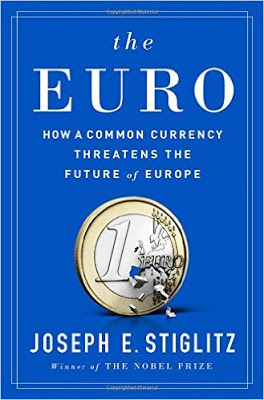
Nobel laureate Joseph Stiglitz’s latest literary effort, a new book about the travails of the Euro and Europe, published in August with the apt title “The Euro: How a Common Currency Threatens the Future of Europe” couldn’t land in the muddy European political waters at a more appropriate time.The summer of 2016 was a turning point for the so-called “European Project” – Europe’s long-run attempt to build a United States of Europe that began with the 1957 Treaty of Rome setting up the European Economic Community (EEC) with six founding members (Germany, France, Italy, Belgium, the Netherlands and Luxemburg), and continued in 1993, with the Maastricht Treaty, the European Union (EU) with (up to now) 28 member countries.Problems have piled up this summer, relentlessly.The opening salvo came in June with the UK referendum that unexpectedly led to “Brexit”, the decision to leave the European Union with 17.4 million Brits voting in favor. For the first time since its foundation, the EU is expected not to expand but to contract, down to 27 members – probably by 2019, when UK exit negotiations will be completed.The most recent problem came in October with another referendum, this time in Hungary, calling on the population to disregard EU policies on refugees and reject quota obligation to accommodate asylum seekers. The referendum did not break the 50% threshold and the result was therefore declared illegal, but it did demonstrate that once again, a hefty minority, 3.6 million Hungarians (43% of voters), supported their government’s continuing opposition to Brussels.Against this background, Joseph Stiglitz’s book has special resonance.As he convincingly argues, the Euro was supposed to bring the European project forward but it has done nothing of the kind – if anything, the European Project has suffered setbacks just as much outside as within the countries of the Eurozone, the 19 EU members who use the Euro as a common currency. Incidentally, this is not a minor currency: The 19 European countries together account for roughly 14 percent of world GNP, making it the third largest economy in the world, after the United States (20 percent) and China (18 percent).Do not delude yourself into thinking this is not important for the rest of the world: should the Euro collapse, the shock would shake the whole world.It could even start another Great Depression.A SLOW DEATHStiglitz minces no words in roundly chastising European leaders for “muddling through” a succession of Euro crises, ever since the first Greek debt scandal broke out in 2010. The book is a convincing diagnosis of what went wrong and why successive “bailouts” of Greece (three so far) have failed miserably, leaving the country six years later with an inexorably rising debt and a Gross Domestic Product diminished by a quarter, while the exceptionally high unemployment (a mind-boggling 50% for the young) won’t budge – really as bad as a war. Stiglitz’ detailed description of the Greek case is harrowing. A must read for anyone who hasn’t followed the drama closely.And he is equally convincing in arguing that Ireland, often promoted (mostly by Germans) as the “poster child” of the success of Europe’s monetary and austerity policies is no such thing. EU-imposed austerity measures “helped ensure that Ireland’s unemployment rate remained in double digits for five years, until the beginning of 2015, causing untold suffering for the Irish people and a world of lost opportunities that can never be regained.” Tough words that apply equally well to the other “crisis countries” of the Eurozone. For example, Portugal, also promoted by the IMF as a “success”, is far from that: The facts are that “the government might be borrowing with more ease, but the Portuguese people never experienced a real recovery.” Indeed, across Europe, excessive reliance on austerity and monetary policy “has resulted in even greater inequality: the big winners are the wealthy, who own stocks and other assets […]; the big losers are the elderly who put their money in government bonds, only to see the interest rates generated virtually disappear.”The reason for such a deplorable state of affairs? First, a misplaced belief in what another famous economist, Paul Krugman, calls the “confidence fairy”: the idea that with austerity and a balanced budget, business confidence will be restored, which overlooks the simple fact that when consumer demand is depressed, business has no incentive to invest. In a recession, the confidence fairy, as Krugman says, becomes a zombie.
To read the rest, click here.
NOTE TO MY READERS: Stiglitz's advice on how to fix the Euro is truly excellent, and I sincerely hope our political leaders will read this book and act on it. I've tried to focus on the policy measures that are really doable among the many ideas Stiglitz presents. Eminently practical, they would take VERY LITTLE EFFORT... if only Germany would stop focusing on stupid austerity policies that are destroying Europe!
Go over to Impakter to read about those policy measures and tell me what you think!









BOOK REVIEW “THE EURO: HOW A COMMON CURRENCY THREATENS THE FUTURE OF EUROPE” BY JOSEPH. E. STIGLITZ (PUBLISHED BY W.W. NORTON & CO, AUGUST 16, 2016)

Nobel laureate Joseph Stiglitz’s latest literary effort, a new book about the travails of the Euro and Europe, published in August with the apt title “The Euro: How a Common Currency Threatens the Future of Europe” couldn’t land in the muddy European political waters at a more appropriate time.The summer of 2016 was a turning point for the so-called “European Project” – Europe’s long-run attempt to build a United States of Europe that began with the 1957 Treaty of Rome setting up the European Economic Community (EEC) with six founding members (Germany, France, Italy, Belgium, the Netherlands and Luxemburg), and continued in 1993, with the Maastricht Treaty, the European Union (EU) with (up to now) 28 member countries.Problems have piled up this summer, relentlessly.The opening salvo came in June with the UK referendum that unexpectedly led to “Brexit”, the decision to leave the European Union with 17.4 million Brits voting in favor. For the first time since its foundation, the EU is expected not to expand but to contract, down to 27 members – probably by 2019, when UK exit negotiations will be completed.The most recent problem came in October with another referendum, this time in Hungary, calling on the population to disregard EU policies on refugees and reject quota obligation to accommodate asylum seekers. The referendum did not break the 50% threshold and the result was therefore declared illegal, but it did demonstrate that once again, a hefty minority, 3.6 million Hungarians (43% of voters), supported their government’s continuing opposition to Brussels.Against this background, Joseph Stiglitz’s book has special resonance.As he convincingly argues, the Euro was supposed to bring the European project forward but it has done nothing of the kind – if anything, the European Project has suffered setbacks just as much outside as within the countries of the Eurozone, the 19 EU members who use the Euro as a common currency. Incidentally, this is not a minor currency: The 19 European countries together account for roughly 14 percent of world GNP, making it the third largest economy in the world, after the United States (20 percent) and China (18 percent).Do not delude yourself into thinking this is not important for the rest of the world: should the Euro collapse, the shock would shake the whole world.It could even start another Great Depression.A SLOW DEATHStiglitz minces no words in roundly chastising European leaders for “muddling through” a succession of Euro crises, ever since the first Greek debt scandal broke out in 2010. The book is a convincing diagnosis of what went wrong and why successive “bailouts” of Greece (three so far) have failed miserably, leaving the country six years later with an inexorably rising debt and a Gross Domestic Product diminished by a quarter, while the exceptionally high unemployment (a mind-boggling 50% for the young) won’t budge – really as bad as a war. Stiglitz’ detailed description of the Greek case is harrowing. A must read for anyone who hasn’t followed the drama closely.And he is equally convincing in arguing that Ireland, often promoted (mostly by Germans) as the “poster child” of the success of Europe’s monetary and austerity policies is no such thing. EU-imposed austerity measures “helped ensure that Ireland’s unemployment rate remained in double digits for five years, until the beginning of 2015, causing untold suffering for the Irish people and a world of lost opportunities that can never be regained.” Tough words that apply equally well to the other “crisis countries” of the Eurozone. For example, Portugal, also promoted by the IMF as a “success”, is far from that: The facts are that “the government might be borrowing with more ease, but the Portuguese people never experienced a real recovery.” Indeed, across Europe, excessive reliance on austerity and monetary policy “has resulted in even greater inequality: the big winners are the wealthy, who own stocks and other assets […]; the big losers are the elderly who put their money in government bonds, only to see the interest rates generated virtually disappear.”The reason for such a deplorable state of affairs? First, a misplaced belief in what another famous economist, Paul Krugman, calls the “confidence fairy”: the idea that with austerity and a balanced budget, business confidence will be restored, which overlooks the simple fact that when consumer demand is depressed, business has no incentive to invest. In a recession, the confidence fairy, as Krugman says, becomes a zombie.
To read the rest, click here.
NOTE TO MY READERS: Stiglitz's advice on how to fix the Euro is truly excellent, and I sincerely hope our political leaders will read this book and act on it. I've tried to focus on the policy measures that are really doable among the many ideas Stiglitz presents. Eminently practical, they would take VERY LITTLE EFFORT... if only Germany would stop focusing on stupid austerity policies that are destroying Europe!
Go over to Impakter to read about those policy measures and tell me what you think!









Published on October 11, 2016 12:19
September 12, 2016
Burkinis and the French Exception
I am stunned: How can France, the land of freedom of expression, wage a war against burkinis? What happened to tolerance? What happened to individual freedom and allowing people to dress as they please? Surely a woman wearing a burkini is no security threat, where would she hide the bombs?
In short, what's the problem with burkinis? They've been around a long, long time except nobody called them "burkinis"...
I painted one such woman wearing a "burkini" on the Gaza public beach back in April 2005:
 Palestininan women going to the beach, Gaza (2005) - oil on wood, 120cm x 70 cm
Palestininan women going to the beach, Gaza (2005) - oil on wood, 120cm x 70 cm
Yes, the woman on the left is in a home-made greenish burkini - that was fully ten years before it occurred to fashion designers to go into the business of making burkinis...
And you could say that our great-grandmothers, who covered themselves up when they went bathing, also wore a form of ante-litteram burkinis:
 Vintage Bathing Suits | Bathing-Suit-Women-in-bathing-suits-on-Collaroy-Beach-1908 (source: Pinterest pin )
Vintage Bathing Suits | Bathing-Suit-Women-in-bathing-suits-on-Collaroy-Beach-1908 (source: Pinterest pin )
So what happened to the idea that France was the cradle of libertarian ideas, the leader of human rights? What happened to French exceptionalism?
It's true that France is exceptional in one way: Unlike the rest of the world, France insists on "laicité", i.e. keeping religion out of the public space. But this is carrying it one step too far. A burkini is not a religious declaration nor an assault on Christianity. It's just a traditional way of dressing making Muslim women comfortable with their bodies, just as our grandmothers were when they went to the beach. Look at them in that photo, don't they look happy and proud of their swimsuits? Why not let Muslim women feel the same?
Has France suddenly had a fit of Trump-like rejection of anything that is not "us"? Has she forgotten how early Victorian swimwear for women looked like? Here's a reminder - yes, fully covered, arms and legs and the head too:
 Source: Fashion Era.com, Pauline Weston Thomas, the Early Seaside Fashion History
Source: Fashion Era.com, Pauline Weston Thomas, the Early Seaside Fashion History









In short, what's the problem with burkinis? They've been around a long, long time except nobody called them "burkinis"...
I painted one such woman wearing a "burkini" on the Gaza public beach back in April 2005:
 Palestininan women going to the beach, Gaza (2005) - oil on wood, 120cm x 70 cm
Palestininan women going to the beach, Gaza (2005) - oil on wood, 120cm x 70 cm
Yes, the woman on the left is in a home-made greenish burkini - that was fully ten years before it occurred to fashion designers to go into the business of making burkinis...
And you could say that our great-grandmothers, who covered themselves up when they went bathing, also wore a form of ante-litteram burkinis:
 Vintage Bathing Suits | Bathing-Suit-Women-in-bathing-suits-on-Collaroy-Beach-1908 (source: Pinterest pin )
Vintage Bathing Suits | Bathing-Suit-Women-in-bathing-suits-on-Collaroy-Beach-1908 (source: Pinterest pin )So what happened to the idea that France was the cradle of libertarian ideas, the leader of human rights? What happened to French exceptionalism?
It's true that France is exceptional in one way: Unlike the rest of the world, France insists on "laicité", i.e. keeping religion out of the public space. But this is carrying it one step too far. A burkini is not a religious declaration nor an assault on Christianity. It's just a traditional way of dressing making Muslim women comfortable with their bodies, just as our grandmothers were when they went to the beach. Look at them in that photo, don't they look happy and proud of their swimsuits? Why not let Muslim women feel the same?
Has France suddenly had a fit of Trump-like rejection of anything that is not "us"? Has she forgotten how early Victorian swimwear for women looked like? Here's a reminder - yes, fully covered, arms and legs and the head too:
 Source: Fashion Era.com, Pauline Weston Thomas, the Early Seaside Fashion History
Source: Fashion Era.com, Pauline Weston Thomas, the Early Seaside Fashion History








Published on September 12, 2016 02:24
August 30, 2016
How One of the Internet's Founders Sees the Future
I just reviewed Steve Case's bestseller, “THE THIRD WAVE – AN ENTREPRENEUR’S VISION OF THE FUTURE” for Impakter Magazine:
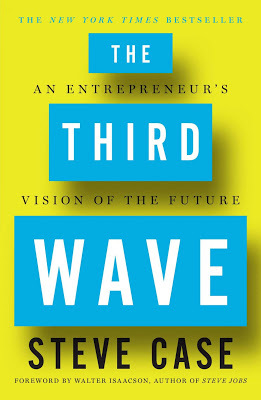
When Steve Case’s book came out on 5 April 2016 (publisher: Simon and Schuster), it was an immediate New York Times and Wall Street Journal sensation, hailed as the number one business book of the year.
Part memoir, part business manual, it’s a must read for at least two reasons:one, because it is a unique memoir from someone who was on the leading edge of the Internet revolution: Steve Case was a co-founder of AOL in 1985, the first Internet company to go public (in 1991), the first to bring millions of Americans online; AOL was a corporate giant that arose a full decade before Google, Amazon and Facebook; Case oversaw the Time Warner-AOL merger in 2000 and became chairman of the combined business, the largest media and communications empire in the world at that time.It is clear that any aspiring entrepreneur could learn from Case’s unique insights into the startup experience, ranging from near death to unexpected comebacks; and, cherry on the cake, the book comes with a mesmerizing series of photographs marking the main events in Case’s life and AOL’s rise.two, it provides an eye-opening vision of the Internet’s future: if anyone has an idea where the Web is headed, surely Steve Case does. In the words of Sheryl Sandberg, Facebook’s COO, he has drawn a “compelling roadmap for the future”. No entrepreneur or corporate manager who wishes to succeed in this first part of the 21st century can afford to ignore Case’s advice.What is remarkable about Steve Case is that he is both an inspired investor and a dedicated philanthropist. IN THE PHOTO: STEVE CASE PHOTO CREDIT: TWITTER Six years before leaving AOL-Time Warner in 2003, Steve Case had launched the Case Foundationwith his wife Jean and had made it his business to bet on upcoming innovative entrepreneurs, keeping himself abreast of all new developments in the IT world.In 2005, he co-founded, along with Donn Davis and Tige Savage, an investment firm aptly called Revolution to finance digital startups, aiming, according to its website, to “support ideas that change the world.” Based in Washington D.C., the firm, of which he is chairman and CEO, also runs a $525 million fund to invest “outside of Silicon Valley” – in fact, as explained on its website, Revolution’s “mission is to establish itself as “the premier firm outside Silicon Valley.”Revolution has helped build up many businesses including the car-sharing app Zipcar, the GPS fitness tracking app Runkeeper, the online learning platform BenchPrep, the daily deal websiteLivingSocial, Sweetgreen, an American “simple, healthy food” restaurant chain and Revolution Money, an online financial services company (sold to American Express in 2009) .In 2010, Steve and Jean Case took the further public step of signing The Giving Pledge, joining other major billionaires like Bill and Melinda Gates, Warren Buffet and Carl Icahn, in reaffirming their commitment to give away most of their wealth to philanthropy.At the same time, Case is a rare believer in a bi-partisan approach to economic policies.Though a Republican, he has worked to support President Obama’s job policies to create employment and spur entrepreneurship. He was a member of Obama’s Council on Jobs and Competitiveness and founding chair of the Startup America Partnership – he is now chairman of UP Global, a non-profit to support entrepreneurial communities, created in 2013 from Startup America Partnership and Startup Weekend. Unlike many in the business community, he strongly believes that the government has a key role to play in jump starting innovation.The foreword is written by Walter Isaacson, President and CEO of the Aspen Institute and author of several acclaimed biographies, most recently of Steve Jobs and of a remarkable history of innovation on the Web called “The Innovators: How a Group of Inventors, Hackers, Geniuses, and Geeks Created the Digital Revolution.“
IN THE PHOTO: STEVE CASE PHOTO CREDIT: TWITTER Six years before leaving AOL-Time Warner in 2003, Steve Case had launched the Case Foundationwith his wife Jean and had made it his business to bet on upcoming innovative entrepreneurs, keeping himself abreast of all new developments in the IT world.In 2005, he co-founded, along with Donn Davis and Tige Savage, an investment firm aptly called Revolution to finance digital startups, aiming, according to its website, to “support ideas that change the world.” Based in Washington D.C., the firm, of which he is chairman and CEO, also runs a $525 million fund to invest “outside of Silicon Valley” – in fact, as explained on its website, Revolution’s “mission is to establish itself as “the premier firm outside Silicon Valley.”Revolution has helped build up many businesses including the car-sharing app Zipcar, the GPS fitness tracking app Runkeeper, the online learning platform BenchPrep, the daily deal websiteLivingSocial, Sweetgreen, an American “simple, healthy food” restaurant chain and Revolution Money, an online financial services company (sold to American Express in 2009) .In 2010, Steve and Jean Case took the further public step of signing The Giving Pledge, joining other major billionaires like Bill and Melinda Gates, Warren Buffet and Carl Icahn, in reaffirming their commitment to give away most of their wealth to philanthropy.At the same time, Case is a rare believer in a bi-partisan approach to economic policies.Though a Republican, he has worked to support President Obama’s job policies to create employment and spur entrepreneurship. He was a member of Obama’s Council on Jobs and Competitiveness and founding chair of the Startup America Partnership – he is now chairman of UP Global, a non-profit to support entrepreneurial communities, created in 2013 from Startup America Partnership and Startup Weekend. Unlike many in the business community, he strongly believes that the government has a key role to play in jump starting innovation.The foreword is written by Walter Isaacson, President and CEO of the Aspen Institute and author of several acclaimed biographies, most recently of Steve Jobs and of a remarkable history of innovation on the Web called “The Innovators: How a Group of Inventors, Hackers, Geniuses, and Geeks Created the Digital Revolution.“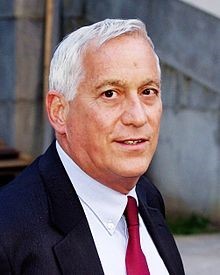 IN THE PHOTO: WALTER ISAACSONWalter Isaacson, in introducing Steve Case for us, evokes the moment when the idea of a Time Warner-AOL merger was first aired out, back in 1999. It happened improbably in Beijing, in the course of a twelve-course banquet for a thousand people at the Great Hall of the People to celebrate the 50th anniversary of the Communist revolution in China. Time magazine, of which Isaacson was editor at the time, had brought to China the whole of the Time Warner Board and a few other American business leaders, notably Steve Case.
IN THE PHOTO: WALTER ISAACSONWalter Isaacson, in introducing Steve Case for us, evokes the moment when the idea of a Time Warner-AOL merger was first aired out, back in 1999. It happened improbably in Beijing, in the course of a twelve-course banquet for a thousand people at the Great Hall of the People to celebrate the 50th anniversary of the Communist revolution in China. Time magazine, of which Isaacson was editor at the time, had brought to China the whole of the Time Warner Board and a few other American business leaders, notably Steve Case.
Read the rest on Impakter, click here.










When Steve Case’s book came out on 5 April 2016 (publisher: Simon and Schuster), it was an immediate New York Times and Wall Street Journal sensation, hailed as the number one business book of the year.
Part memoir, part business manual, it’s a must read for at least two reasons:one, because it is a unique memoir from someone who was on the leading edge of the Internet revolution: Steve Case was a co-founder of AOL in 1985, the first Internet company to go public (in 1991), the first to bring millions of Americans online; AOL was a corporate giant that arose a full decade before Google, Amazon and Facebook; Case oversaw the Time Warner-AOL merger in 2000 and became chairman of the combined business, the largest media and communications empire in the world at that time.It is clear that any aspiring entrepreneur could learn from Case’s unique insights into the startup experience, ranging from near death to unexpected comebacks; and, cherry on the cake, the book comes with a mesmerizing series of photographs marking the main events in Case’s life and AOL’s rise.two, it provides an eye-opening vision of the Internet’s future: if anyone has an idea where the Web is headed, surely Steve Case does. In the words of Sheryl Sandberg, Facebook’s COO, he has drawn a “compelling roadmap for the future”. No entrepreneur or corporate manager who wishes to succeed in this first part of the 21st century can afford to ignore Case’s advice.What is remarkable about Steve Case is that he is both an inspired investor and a dedicated philanthropist.
 IN THE PHOTO: STEVE CASE PHOTO CREDIT: TWITTER Six years before leaving AOL-Time Warner in 2003, Steve Case had launched the Case Foundationwith his wife Jean and had made it his business to bet on upcoming innovative entrepreneurs, keeping himself abreast of all new developments in the IT world.In 2005, he co-founded, along with Donn Davis and Tige Savage, an investment firm aptly called Revolution to finance digital startups, aiming, according to its website, to “support ideas that change the world.” Based in Washington D.C., the firm, of which he is chairman and CEO, also runs a $525 million fund to invest “outside of Silicon Valley” – in fact, as explained on its website, Revolution’s “mission is to establish itself as “the premier firm outside Silicon Valley.”Revolution has helped build up many businesses including the car-sharing app Zipcar, the GPS fitness tracking app Runkeeper, the online learning platform BenchPrep, the daily deal websiteLivingSocial, Sweetgreen, an American “simple, healthy food” restaurant chain and Revolution Money, an online financial services company (sold to American Express in 2009) .In 2010, Steve and Jean Case took the further public step of signing The Giving Pledge, joining other major billionaires like Bill and Melinda Gates, Warren Buffet and Carl Icahn, in reaffirming their commitment to give away most of their wealth to philanthropy.At the same time, Case is a rare believer in a bi-partisan approach to economic policies.Though a Republican, he has worked to support President Obama’s job policies to create employment and spur entrepreneurship. He was a member of Obama’s Council on Jobs and Competitiveness and founding chair of the Startup America Partnership – he is now chairman of UP Global, a non-profit to support entrepreneurial communities, created in 2013 from Startup America Partnership and Startup Weekend. Unlike many in the business community, he strongly believes that the government has a key role to play in jump starting innovation.The foreword is written by Walter Isaacson, President and CEO of the Aspen Institute and author of several acclaimed biographies, most recently of Steve Jobs and of a remarkable history of innovation on the Web called “The Innovators: How a Group of Inventors, Hackers, Geniuses, and Geeks Created the Digital Revolution.“
IN THE PHOTO: STEVE CASE PHOTO CREDIT: TWITTER Six years before leaving AOL-Time Warner in 2003, Steve Case had launched the Case Foundationwith his wife Jean and had made it his business to bet on upcoming innovative entrepreneurs, keeping himself abreast of all new developments in the IT world.In 2005, he co-founded, along with Donn Davis and Tige Savage, an investment firm aptly called Revolution to finance digital startups, aiming, according to its website, to “support ideas that change the world.” Based in Washington D.C., the firm, of which he is chairman and CEO, also runs a $525 million fund to invest “outside of Silicon Valley” – in fact, as explained on its website, Revolution’s “mission is to establish itself as “the premier firm outside Silicon Valley.”Revolution has helped build up many businesses including the car-sharing app Zipcar, the GPS fitness tracking app Runkeeper, the online learning platform BenchPrep, the daily deal websiteLivingSocial, Sweetgreen, an American “simple, healthy food” restaurant chain and Revolution Money, an online financial services company (sold to American Express in 2009) .In 2010, Steve and Jean Case took the further public step of signing The Giving Pledge, joining other major billionaires like Bill and Melinda Gates, Warren Buffet and Carl Icahn, in reaffirming their commitment to give away most of their wealth to philanthropy.At the same time, Case is a rare believer in a bi-partisan approach to economic policies.Though a Republican, he has worked to support President Obama’s job policies to create employment and spur entrepreneurship. He was a member of Obama’s Council on Jobs and Competitiveness and founding chair of the Startup America Partnership – he is now chairman of UP Global, a non-profit to support entrepreneurial communities, created in 2013 from Startup America Partnership and Startup Weekend. Unlike many in the business community, he strongly believes that the government has a key role to play in jump starting innovation.The foreword is written by Walter Isaacson, President and CEO of the Aspen Institute and author of several acclaimed biographies, most recently of Steve Jobs and of a remarkable history of innovation on the Web called “The Innovators: How a Group of Inventors, Hackers, Geniuses, and Geeks Created the Digital Revolution.“ IN THE PHOTO: WALTER ISAACSONWalter Isaacson, in introducing Steve Case for us, evokes the moment when the idea of a Time Warner-AOL merger was first aired out, back in 1999. It happened improbably in Beijing, in the course of a twelve-course banquet for a thousand people at the Great Hall of the People to celebrate the 50th anniversary of the Communist revolution in China. Time magazine, of which Isaacson was editor at the time, had brought to China the whole of the Time Warner Board and a few other American business leaders, notably Steve Case.
IN THE PHOTO: WALTER ISAACSONWalter Isaacson, in introducing Steve Case for us, evokes the moment when the idea of a Time Warner-AOL merger was first aired out, back in 1999. It happened improbably in Beijing, in the course of a twelve-course banquet for a thousand people at the Great Hall of the People to celebrate the 50th anniversary of the Communist revolution in China. Time magazine, of which Isaacson was editor at the time, had brought to China the whole of the Time Warner Board and a few other American business leaders, notably Steve Case.Read the rest on Impakter, click here.









Published on August 30, 2016 01:07



